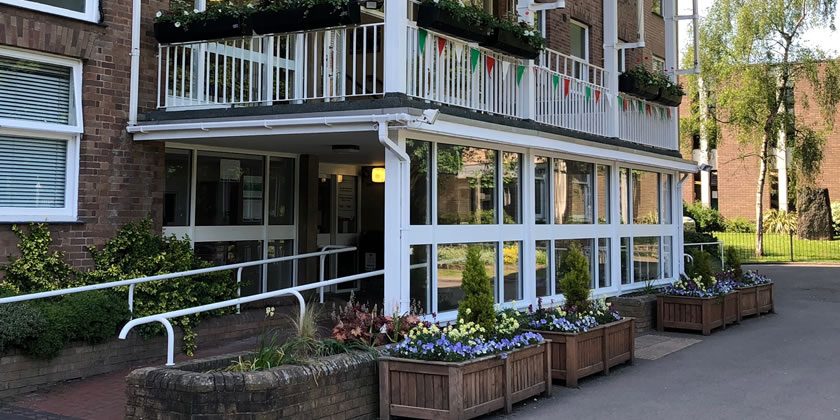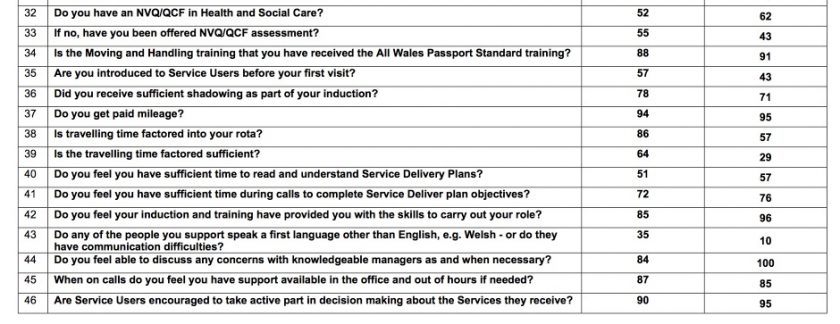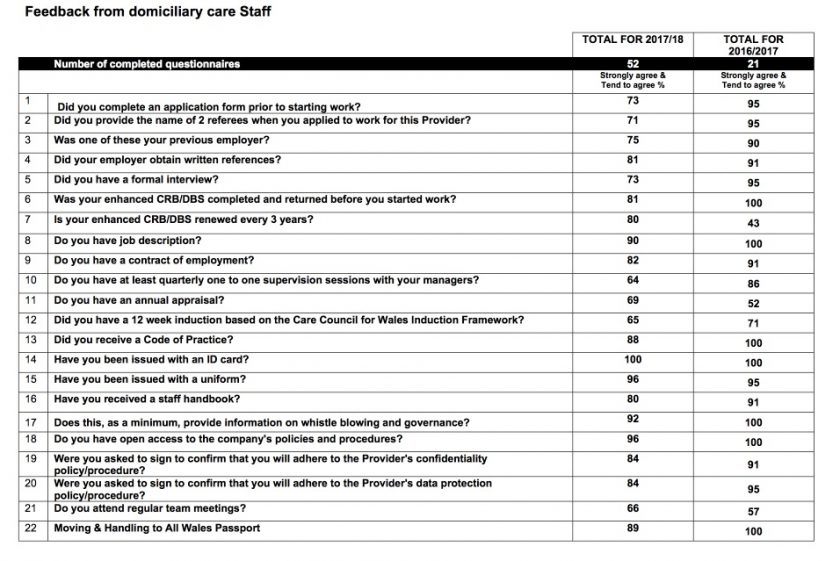Wrexham domiciliary care survey results disputed as questions raised over DBS and reference checks

Scrutiny committee members yesterday dissected care staff survey responses that indicated not all had Disclosure and Barring Service checks completed before starting work, staff handbooks or uniforms. However council officers stated their checks on paperwork indicated the survey responses were incorrect.
Wrexham Council’s Service Manager for older people, Adult Protection Officer and the Head of Department all attended the safeguarding, communities and well-being scrutiny committee ,along with Lead Member Joan Lowe to answer questions from councillors over Wrexham Council’s Adult Protection Report – and specifically the data in an accompanying appendix.
The next agenda item over a report on Adult Social Care Contract Monitoring was answered by the same staff, and was subject to similar examination.
The appendix contained a range of information, including graphs detailing adults at risk referrals, types of abuse referred, and the later report included survey responses from both from recipients of domiciliary care and staff.
Cllr Derek Wright commended officers on the improvements made that were noted in the reports, paying particular attention to the doubling of the number of enquiries that were completed within seven days.
Cllr John Pritchard queried over the high number of referral received in January (49) compared with other months data was given for, and was told it could be for various reasons including family members visiting homes for Christmas and seeing something to report.
Later Cllr Pritchard picked up on that point to ensure more detail is given to the spike in future, pointing out if that was a possible reason it could mean issues are missed for several months. The officer noted the explanation was an example, and was not evidence based nor certain, and would be looked at.
Councillors looking at the data made several suggestions on how to improve the information provided, with Cllr Trevor Bates asking for separate graphing of types of abuse to demonstrate if the reports were inappropriate or not, and others suggesting more data and numbers on other areas to be provided in the future.
With the second report on the table before the committee an overview of the Contract Monitoring Framework was given, as Wrexham Council procure services from third parties to deliver their adult social care obligations.
Cllr I David Bithell asked for details over the numbers in the report, that notes there are 38 Care Home Providers within the County Borough area who are registered to provide 1323 beds across the county. 519 were long-term placements funded by Wrexham Council, and in addition, 53 placements are commissioned from homes not within Wrexham County Borough.
Cllr Bithell was told there is a ‘mixture’ of fully funded and part funded places, “Some are fully funded by us, most people pay something towards care.
“There are care homes that people choose that charge third party top ups. Top ups are something we are keeping an eye on as its increasing, and we are aware of the issue of top ups.”
Probing the charges, Cllr Bithell was told Wrexham Council pays a set rate fee depending on the category of care and that the figures are calculated yearly in a ‘very transparent’ process.
Although not naming which home or what the details were, Cllr Bithell asked if a £800 a week fee to an individual was ‘unreasonable’ in the view of the officers or lead councillor. There was some murmurs about ‘Part 2’ information, however the officer gave a straightforward answer: “We can’t control that. We have a rate. What care homes choose to charge themselves is their business it is a private market.”
The report notes Wrexham Council’s Contract and Monitoring Officers have a programme of work which includes routine monitoring of residential care homes and also supporting homes within the ‘Escalating Concerns’ process.
During 2017/18 2 homes were placed under Escalating Concerns; a further five homes were identified as being of increasing concern. There were a number of common themes which tended to push providers into Escalating Concerns, or increased concerns, including management and leadership, staffing levels, training and increasing numbers of safeguarding referrals.
As five homes were under concern, councillors enquired what was being done.
The meeting was told: “We have regular meetings with the home manager and collectively from health and care inspector of Wales. We share concerns and produce an action plan. We offer support and advice. We increase our monitoring, aside of our annual monitoring we do unannounced visits.
“We also speak to the residents that live there and family members to get a holistic view, and work very closely with advocates.”
Cllr Brian Cameron focused in on the turnover of staffing in the sector, and explained how he thought zero hour contracts could be a possible reason, and lack of career progression.
The council officer explained that they recognised that recruitment and retention ‘was an issue’, and a new section of legislation will mean all staff in the care sector will have to be registered, and if people are not registered they can’t work in the sector.
The meeting was told of how previously there were over 200 different qualifications possible in the sector to varying standards, however that has been ‘narrowed down’ to some that all health and social care staff will require by 2020.
On zero hour contracts the meeting was told some staff do prefer them, with the explanation that work can be handed back at short notice. Evidence was given of meeting ‘large staff groups’ that backed up that view. Low staff wages, some with the added cost of the all-but-requirement of having to run a vehicle as well to do their job, coupled with Wrexham’s range of retail job opportunities were given as reasons for ‘competition’ to retain or recruit staff.
Cllr Cameron made it clear he was ‘not saying staff are not giving their best’, explaining his questioning revolved around the consistency of care for the person who needed it to ‘build trust’, ‘We have got high levels of turnover, we should be better than that’.
Questions moved on to the survey responses section of the report, with Cllr Dana Davies converting the percentages given to numbers of actual people the figure represented. She pointed out 55 people strongly or tended to agree to “Have you been left without care on any occasion during the last 12 months?”.
Cllr Davies said her ‘main concern’ was over the feedback from domiciliary care staff where “Was your enhanced CRB/DBS completed and returned before you started work?” did not get a 100% agree score, just 81%.
Similarly “Did you have a 12 week induction based on the Care Council for Wales Induction Framework?” scored just 81%, “Have you received a staff handbook?” 80%, and just 71% indicated agreement with the statement “Did you provide the name of 2 referees when you applied to work for this Provider?”
As Cllr Davies was due to leave the meeting within five minutes of asking the question she was directed to table the questions in writing for a fuller response in the future as in effect she appeared to be raising most non-100% scores in the list.
Cllr Gwenfair Jones raised similar points, noting that the report gave a figure of 57% of staff were not introduced to clients, with Cllr Bates pointing out ‘anyone could walk in and say they were a carer’.
The council officer explained “This is what staff have told us, and we do have a number of sources of information. For example, we randomly sample staff files.”
“The staff files are telling us a different story, we are seeing references, supervision records and so on.
“When we are working with a home we know which agency the returns have come from, and we work closely with the agency. The files say one thing, the staff say another.”
“We look at the accuracy of records, and the audit of files. That tells us it is not going on.”
“We have to try and find out why the staff are not understanding.”
Cllr John Pritchard expressed his concern about hiring without Disclosure and Barring Service checks, which the survey indicated had happened.
The officer pointed out that legally would not happen, and that they sample staff records to check for that, pointing out the process involves a wider sampling if problems are found.
With recent well documented issues in the care provider sector, including one recently going out of business, questions were asked about how Wrexham is safeguarding about possible issues.
The meeting was told with cautious confidence that Wrexham Council’s set up is ‘pretty resilient’ with a working group exploring what would happen in various scenarios ‘if the worst happened’, ranging from a staggered withdrawal of service to a ’11th hour call’ at the weekend to bring services in-house.
The committee thanked officers and the lead member for work done and the report, and requested that the concerns and changes suggested be added to future reporting.
Copies of some survey responses below…
Spotted something? Got a story? Email [email protected]
















